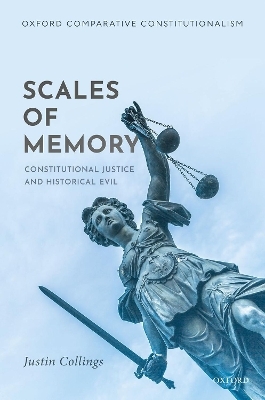
Scales of Memory
Oxford University Press (Verlag)
978-0-19-885885-0 (ISBN)
Since the Second World War, constitutional justice has spread through much of the democratic world. Often it has followed in the wake of national calamity and historical evil - whether fascism or communism, colonialism or apartheid. Unsurprisingly, the memory of such evils plays a prominent role in constitutional adjudication. This book explores the relationship between constitutional interpretation and the memory of historical evil. Specifically, it examines how the constitutional courts of the United States, Germany, and South Africa have grappled, respectively, with the legacies of slavery, Nazism, and apartheid.
Most courts invoke historical evil through either the parenthetical or the redemptive mode of constitutional memory. The parenthetical framework views the evil era as exceptional - a baleful aberration from an otherwise noble and worthy constitutional tradition. Parenthetical jurisprudence reaches beyond the evil era toward stable and enduring values. It sees the constitutional response to evil as restorative rather than revolutionary - a return to and reaffirmation of older traditions. The redemptive mode, by contrast, is more aggressive. Its aim is not to resume a venerable tradition but to reverse recent ills. Its animating spirit is not restoration, but antithesis. Its aim is not continuity with deeper pasts, but a redemptive future stemming from a stark, complete, and vivid rupture.
This book demonstrates how, across the three jurisdictions, the parenthetical mode has often accompanied formalist and originalist approaches to constitutional interpretation, whereas the redemptive mode has accompanied realist and purposive approaches. It also shows how, within the three jurisdictions, the parenthetical mode of memory has consistently predominated in American constitutional jurisprudence; the redemptive mode in South African jurisprudence; and a hybrid, parenthetical-redemptive mode in German constitutional jurisprudence. The real-world consequences of these trends have been stark and dramatic. Memory matters, especially in constitutional interpretation.
Justin Collings is Professor of Law at the J. Reuben Clark Law School of Brigham Young University, where he has taught since 2013. He is the author of Democracy's Guardians: A History of the German Federal Constitutional Court, 1951-2001 (OUP, 2015). He holds both a PhD in History and a JD from Yale University and was a law clerk to the Honourable Guido Calabresi at the United States Court of Appeals for the Second Circuit.
I. Introduction: Constitutional Justice and Collective Memory
1: Introduction
2: Modes of Judicial Memory
3: The Modes and the Courts
4: Constitutional Memory in Comparative Perspective
5: Conclusion
PART ONE: SLAVERY
II. A Century of Lost Time: 1865-1954
1: Introduction: Memorial Day 1895
2: Mnemonic Gilded Age - After Appomattox: 1865-1896
3: After Plessy: 1896-1954
III. After Brown
1: Introduction
2: From Brown to the Civil Rights Act: 1954-1964
3: From the Civil Rights Act to Bakke: 1964-1978
4: From Bakke to Grutter: 1978-2003
5: Constitutional Memory on the Roberts Court
6: Conclusion
PART TWO: AFTER AUSCHWITZ
IV. After Hitler: 1951-1975
1: Introduction: 10 March 1965
2: Anti-Nazi Assertion and Parenthetical Restraint: 1949-1959
3: Memory Subdued, then Roused: 1959-1975
4: The Social-Liberal Coalition: 1969-1975
5: Conclusion
V. Forever in Hitler's Shadow? The Court Since 1975
1: Introduction: Constitutional Patriotism and the Pre-Constitutional Past
2: The Path to Permanence: 1975-1990
3: Republic of Memory: 1989 and Beyond
4: Conclusion: Generations of Judicial Memory
PART THREE: AFTER APARTHEID
VI. South Africa's First Constitutional Court: 1995-2005
1: Introduction: 10 May 1994
2: Epic Beginnings
3: Crime, Punishment, and the Mnemonics of Redemption
4: Bridge in the Background: The Presence of the Past
5: Spheres of Equality
6: Realms of Liberty
7: Realms of Positive Freedom: Socio-Economic Rights
8: Conclusion
VII. Chasing Rainbows: 2005-2020
1: Introduction: Rainbows End?
2: Continuities
3: Making National Memory
4: Memory and Power
5: Political Rights
6: Socio-Economic Rights
7: Conclusion: The Limits of Judicial Vergangenheitsbewältigung
VIII. Conclusion: Memory in the Balance
1: Constitutional Courts as Sites of Memory
2: Revisiting Modes and Models
| Erscheinungsdatum | 09.03.2021 |
|---|---|
| Reihe/Serie | Oxford Comparative Constitutionalism |
| Verlagsort | Oxford |
| Sprache | englisch |
| Maße | 164 x 241 mm |
| Gewicht | 710 g |
| Themenwelt | Recht / Steuern ► Allgemeines / Lexika |
| Recht / Steuern ► EU / Internationales Recht | |
| Recht / Steuern ► Öffentliches Recht | |
| Sozialwissenschaften ► Politik / Verwaltung ► Politische Theorie | |
| ISBN-10 | 0-19-885885-X / 019885885X |
| ISBN-13 | 978-0-19-885885-0 / 9780198858850 |
| Zustand | Neuware |
| Informationen gemäß Produktsicherheitsverordnung (GPSR) | |
| Haben Sie eine Frage zum Produkt? |
aus dem Bereich


